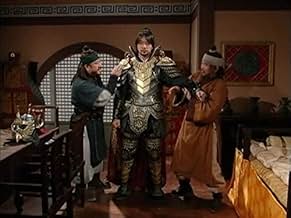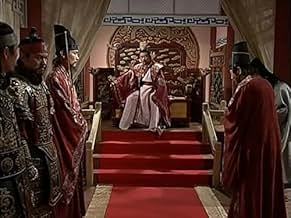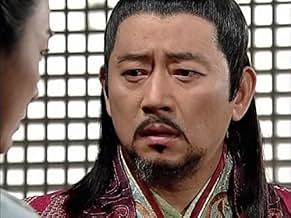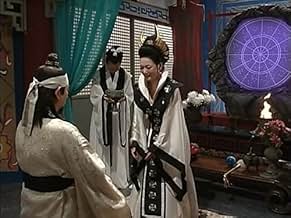IMDb RATING
8.1/10
4.5K
YOUR RATING
An epic based on the myth of Jumong, founder of the ancient Korean kingdom of Goguryeo in 37 B.C.An epic based on the myth of Jumong, founder of the ancient Korean kingdom of Goguryeo in 37 B.C.An epic based on the myth of Jumong, founder of the ancient Korean kingdom of Goguryeo in 37 B.C.
- Awards
- 4 wins & 7 nominations
Browse episodes
Storyline
Did you know
- TriviaJumong had the highest ratings of all Korean dramas in 2006 in Korea.
- ConnectionsFollowed by The Kingdom of the Winds (2008)
- SoundtracksThe World Calls Me
Performed by Insooni
Featured review
At no point in my lifetime have I felt so sentimental after viewing a television series. Yes, "Dae Jang Geum" (aka "A Jewel In the Palace") (2003) was magnificent, but "Jumong" (2006) is so overwhelmingly awesome on every possible level that it actually exceeds "Dae Jang Geum" in a number of ways. At this very moment I feel as if I've just completed a long journey with my closest friends, but now must say goodbye and move on. I kid you not, I feel hopelessly melancholy, because "Jumong" is an exceptional television series that has burrowed its way into my heart. This is special.
The scriptwriting is no less than phenomenal. There are multiple interests at play (royal family members, merchants, sorceresses, other kingdoms, tribes, etc.), and it's interesting to see them strategize and plot against one another. One of the most enjoyable aspects of this series are the strategy meetings that saturate each and every episode. Each character has his/her close confidants and meets with them regularly to discuss specific tactics to gain an advantage against their rivals, which makes for a seemingly non-stop display of cloak-and-dagger scheming. I personally find these exchanges exhilarating because they rely on intelligence and unorthodox (outside the box) thinking. There's a high emphasis on political coersion, unorthodox alliances, and subtle shifts in power from key events. The dialogue is great, crafting a number of exciting, clever exchanges between the players. Fantastic stuff! The obstacles are also very practical and interesting: discovering a sufficient salt supply, creating steel weaponry, obtaining national independence from hostile, more powerful kingdoms, etc. In addition, these conflicts help to accentuate an emotional resonance due to the large number of episodes dedicated to properly develop each obstacle and their climactic conclusions.
It's difficult for movies and television series to establish even a few memorable characters. "Jumong" has no less than 20. No, that is no overstatement, because 81 episodes (over a full hour each) allows for characters to be given heaping amounts of development that makes them multi-dimensional (even fallen comrades from the earlier episodes are never forgotten). Near the beginning it's somewhat easy to distinguish the "good guys" from the "bad guys", but as the series progresses it adds dimensions that ultimately result in haphazard classifications between "protagonists" and "antagonists." Some of the "good guys" will do "bad things" while some of the "bad guys" will do "good things." This will throw the viewer off guard, because at first the added dimensions may seem unwarranted, but over time these characters will express their actions within the light of logical decision-making. The use of multiple kingdoms adds greatly to this, because a kingdom may benefit from a specific alliance at one point in history, but may suffer greatly from maintaining that same alliance in the future.
Make no mistake, there are some clear protagonists, and within this grand journey there are a number impediments and setbacks that bring these characters closer to their confidants, as well as the viewer. The most impressive player, however, is the main protagonist (Jumong), who is sculpted into a truly charismatic, convincing leader who understands when to fight and when to express humility and passiveness. I have personally never seen a military leader as charismatic nor as convincing as "Jumong." He's quite literally the blueprint for leadership. The few other IMDb reviews already flesh out the other characters, so I will avoid that here, but I assure you that they are all great.
So, are there *any* flaws in this series. Surely, any cinematic endeavor that lasts 81+ hours is going to have a few. For example, the budget restrictions are evident in that the number of extras are a bit thin (especially during battles), but that's a minor flaw because most of the battles involve "detached advancements" that involve fewer extras. The scoring is also limited, but the choice tunes are excellent and will only seem "repetitive" when the viewer watches 3 or 4 episodes in a row, which may be inevitable given just how addictive this series is. Regardless of a few other negligible cons, this is a highly addictive period drama/action series that currently holds my official award for "Best Television Series Ever Made."
I said goodbye to my friends for now, but my DVD set awaits for a reunion in the future. I promise you that I will pay them multiple visits to experience the joy of the journey again.
The scriptwriting is no less than phenomenal. There are multiple interests at play (royal family members, merchants, sorceresses, other kingdoms, tribes, etc.), and it's interesting to see them strategize and plot against one another. One of the most enjoyable aspects of this series are the strategy meetings that saturate each and every episode. Each character has his/her close confidants and meets with them regularly to discuss specific tactics to gain an advantage against their rivals, which makes for a seemingly non-stop display of cloak-and-dagger scheming. I personally find these exchanges exhilarating because they rely on intelligence and unorthodox (outside the box) thinking. There's a high emphasis on political coersion, unorthodox alliances, and subtle shifts in power from key events. The dialogue is great, crafting a number of exciting, clever exchanges between the players. Fantastic stuff! The obstacles are also very practical and interesting: discovering a sufficient salt supply, creating steel weaponry, obtaining national independence from hostile, more powerful kingdoms, etc. In addition, these conflicts help to accentuate an emotional resonance due to the large number of episodes dedicated to properly develop each obstacle and their climactic conclusions.
It's difficult for movies and television series to establish even a few memorable characters. "Jumong" has no less than 20. No, that is no overstatement, because 81 episodes (over a full hour each) allows for characters to be given heaping amounts of development that makes them multi-dimensional (even fallen comrades from the earlier episodes are never forgotten). Near the beginning it's somewhat easy to distinguish the "good guys" from the "bad guys", but as the series progresses it adds dimensions that ultimately result in haphazard classifications between "protagonists" and "antagonists." Some of the "good guys" will do "bad things" while some of the "bad guys" will do "good things." This will throw the viewer off guard, because at first the added dimensions may seem unwarranted, but over time these characters will express their actions within the light of logical decision-making. The use of multiple kingdoms adds greatly to this, because a kingdom may benefit from a specific alliance at one point in history, but may suffer greatly from maintaining that same alliance in the future.
Make no mistake, there are some clear protagonists, and within this grand journey there are a number impediments and setbacks that bring these characters closer to their confidants, as well as the viewer. The most impressive player, however, is the main protagonist (Jumong), who is sculpted into a truly charismatic, convincing leader who understands when to fight and when to express humility and passiveness. I have personally never seen a military leader as charismatic nor as convincing as "Jumong." He's quite literally the blueprint for leadership. The few other IMDb reviews already flesh out the other characters, so I will avoid that here, but I assure you that they are all great.
So, are there *any* flaws in this series. Surely, any cinematic endeavor that lasts 81+ hours is going to have a few. For example, the budget restrictions are evident in that the number of extras are a bit thin (especially during battles), but that's a minor flaw because most of the battles involve "detached advancements" that involve fewer extras. The scoring is also limited, but the choice tunes are excellent and will only seem "repetitive" when the viewer watches 3 or 4 episodes in a row, which may be inevitable given just how addictive this series is. Regardless of a few other negligible cons, this is a highly addictive period drama/action series that currently holds my official award for "Best Television Series Ever Made."
I said goodbye to my friends for now, but my DVD set awaits for a reunion in the future. I promise you that I will pay them multiple visits to experience the joy of the journey again.
- How many seasons does Jumong have?Powered by Alexa
Details
- Release date
- Country of origin
- Language
- Also known as
- The Book of the Three Hans
- Filming locations
- Production company
- See more company credits at IMDbPro
- Runtime1 hour
- Color
Contribute to this page
Suggest an edit or add missing content
































